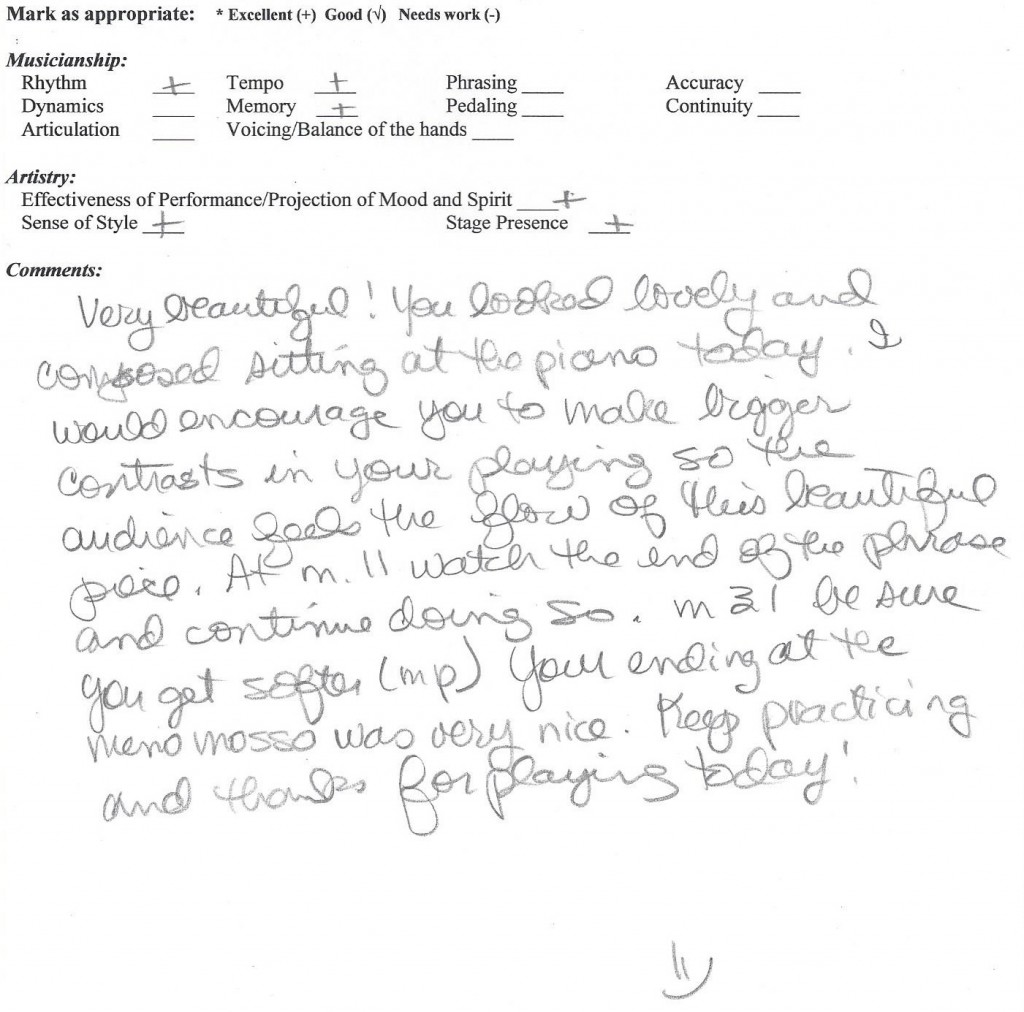While many of my students studied a concerto over the last couple months, several of the older students were not able to compete yesterday due to sports events, ACT, etc.
I had five students in the 1st – 3rd grade category, and one in the 4th-6th grade category. They all played well and were able to convey the character of their pieces in an appropriate manner. Ethan was awarded First Place, Heather and Marlena got Honorable Mention. Why Angie and Evelyn were not recognized for their performances is baffling as their performances were just as good: Angie did a marvelous job taking her time to play slowly with expression and maturity. And Evelyn tackled a very long Minuet; playing with beautiful and very clear dynamics and a steady but not rigid tempo, mastering the tricky ornaments.
Jay played the second movement of Martha Mier’s Concerto in Classical Style with beautiful expression. Unfortunately, on the bottom of the second page of her three-page piece, she hit a wrong note, took a wrong turn, and was thrown for a loop so completely that for a moment she just sat there, stunned. But – and I think this is what counts – when I asked if she could continue on the third page, she was not only able to do that, but she finished her piece beautifully, as if nothing had happened. (Bitter tears into her mom’s shoulder after her performance were proof that something devastating had happened.)
There were other students in the same category who played in a less accomplished manner – sloppy technique, not much expression – who were awarded Honorable Mention.
Why the judge decided not to recognize Jay’s performance with an Honorable Mention I do not understand, especially since at least one other student, in a different category, had memory lapses as well, not just one but several of them, and so profound that he had to resort to looking at his teacher’s score to refresh his memory. It was obvious though that without the memory lapses his playing was very accomplished, and the judge recognized this and awarded a second place. It makes me sad that the judge did not show the same kind of understanding to Jay.
This is not the first competition, of course, where I don’t agree with the judge’s decisions – and it has nothing to do with my students not making all first place. As a matter of fact, I once disagreed with the judge on one of my students making First Place: I didn’t think his performance was good enough. And there are always times where I don’t understand the judge’s rationale regarding other (teachers’) students’ placement.
Which raises an awkward question then: why, if I tend to disagree with the judges’ decisions, do we enter competitions at all?
I could say, and have said, that the journey is more important than the destination.
In preparation for the competition we had had weekly rehearsals which fostered not only an aspect of community among the students and parents, but also made performing their concertos – at least for their peers – something they did comfortably, with ease and confidence.
We discussed and practiced aspects of performing: how to walk up to the piano, how to bow (not too fast!), how to sit, how to wait (hands in your lap), how to start the piece, how to finish, etc and so on. And it showed: several people commented that my students performed with poise and confidence. Which is a life skill I hope they take into other aspects of performing: giving a speech, a presentation; how they carry themselves.
It was also a good experience to take a difficult piece and bring it to a high level of mastery, higher than we normally aspire to with our regular pieces. It was a good experience to learn to deal with getting tired of working on the same thing, again, on detail work, again …, on performing without letting the fatigue show. Again, a life skill I hope.
But that’s like sour grapes.
While it is nice for a teacher to be able to say, “My students took home such and so many prizes” it’s not really something I base my worth or reputation on. But it would have been nice for my students to have this outside, official proof that they did well.
I suppose the real life lesson here is – and this is of course nothing new at all -, the real life lesson is that competitions are subjective, and sometimes you get lucky and there is appropriate recognition for your work, and sometimes you don’t and there isn’t.
I try to be very specific in my teaching, helping my students figure out what exactly is not good enough, and then how to improve it. So I am always looking forward to the judge’s comments, the critique sheets, as I expect they tell us what he/she felt was good and what could be better. This year, I was hoping to find something in the comments that would explain why one student got Honorable Mention but another didn’t when I felt they had played equally well. Here are two critique sheets, with identifying details left out, so we can focus on just the comments:
 One of the above got Honorable Mention, the other didn’t. From the comments, I can’t tell. How am I supposed to explain to my students what the criteria were if they are not obvious from the critique sheet?
One of the above got Honorable Mention, the other didn’t. From the comments, I can’t tell. How am I supposed to explain to my students what the criteria were if they are not obvious from the critique sheet?


